Please visit also the Sacred and Secular Men’s Chorus pages from the Publications page.
Opera and Classical

(1770-1827)
A Crash of Canons Four Beethoven canons edited for three and four voices in German, English and Italian.
2. Signor Abate for three voices (WoO 178)
3. An Mälzel (To Maelzel) for four voices / Anton Schindler (1795-1864)
4. Glück zum neuen Jahr (Happy new year) for four voices (WoO 176).
View note and score.
Ludwig van Beethoven (1770-1827) wrote many occasional pieces for his friends and acquaintances, often in the form of canons in a great diversity of styles and voicings. This collection brings together in a performing edition a variety of Beethoven's canons. Signor Abate is a polyglot canon for three voices, the Italian text begging the abbot to come and give a blessing to the ailing, and the German telling him to go to the devil if he does not come! Glück zum neuen Jahr is one of Beethoven's loveliest canons and a fine addition to the New Year's musical repertory. Feel free to revoice, transpose, and repeat these canons until their delights have been fully explored. Above all sing them with the joy, wit and delight that the sometimes sombre master could enjoy upon occasion!

Laut verkünde uns’re Freude from Eine kleine Freimaurerkantate K. 623 by W.A. Mozart (1756-1791). Edited for three-part men’s voices and piano by Bruce Trinkley.
View score. Listen to live performance with orchestra.
The Little Masonic Cantata was Mozart’s last completed work,written for the consecration of the temple of the masonic lodge in Vienna in 1791. The text is by Emanuel Schikaneder (1751-1812), who also wrote the libretto for Mozart’s last opera, The Magic Flute. The brilliant chorus is a great concert opener and is also appropriate for the dedication of a performance space.
Let the echoes of these walls resound in every brother’s heart.
For we dedicate this place by the bond of brotherhood,
And the true union of hearts, today as our place of worship.
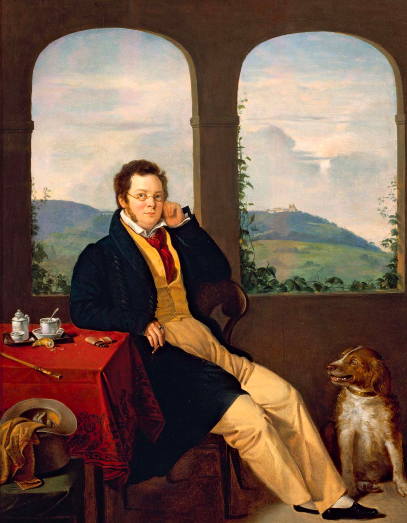
March and Chorus (Schubert) Opera chorus edited for TTBB and piano.
Comic chorus in German and English (translation by Jason Charnesky) from the singspiel
The Conspirators (Die Verschworenen) by Franz Schubert (1797-1828). The libretto is based on the play Lysistrata by the ancient Greek playwright Aristophanes about male-female relations in times of war. Download score.
Our warring days are through.
We bid them fond adieu.
We fought with saber, blade and gun;
We fought, sometimes we even won.
As the hawk pursues the dove,
We now forswear our martial arts,
We heed the promises of love.
. . . . A knight’s a noble valiant son,
And when his day’s brave deeds are done,
He’s earned a good night’s sleep . . . . .
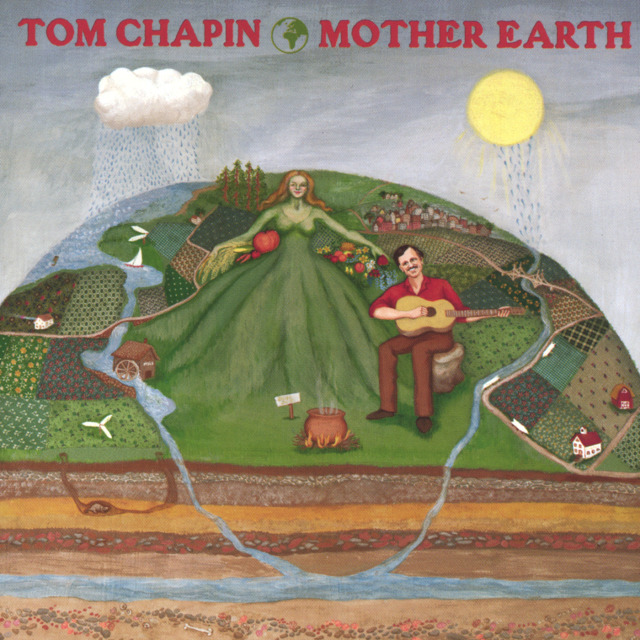
The Picnic of the World Music by Jacques Offenbach (1819-1880) from Orpheus in the Underworld. (1858). Lyrics by John Forster and sung by Tom Chapin.
For men’s voices and piano with optional string bass and drums.
Forster’s lyrics set to Offenbach’s infectious Can Can from the operetta create a vision of world peace where all the nations of the world come together . . . .
View score. Listen to Tom Chapin.
All the nations sitting on a blanket,
Having a picnic, the Picnic of the World.
There's Holland and there's Poland
and there's Iceland and there's Thailand.
There's England and there's Scotland and America (that's my land).
There's Canada and Panama . . . . . .
All sitting on the same big blanket with the same big basket
full of problems and annoyances
but all knowing at the deep down heart of it
we're all a part of it, the Picnic of the World.
Ra-ta-plan Music by Gaetano Donizetti (1797-1848) from
The Daughter of the Regiment (1840)
Comic opera chorus edited for TTB and piano. Alfred Publishing LG52926
Rousing and exciting men’s chorus with humorous text by Jason Charnesky.
View full score and purchase score from Alfred Publishing. Listen to midi.
Seven Songs by Chopin by Frederic Chopin (1810-1849) Arranged for SATB, TTBB and SSA and piano.
My inspiration for these arrangements was Frostiana, seven settings of Robert Frost poems by Randall Thompson where two are for men’s voices, two are for women’s voices, and three are for mixed voices. Hal Leonard published each group in Seven Songs separately. Here are the two for men’s voices:
6. The Ring
Wedding Chorus Arranged for TTB and piano.
Lovely lyrical chorus in French and English from Beatrice et Bénédict (1862), opera comique by Hector Berlioz (1803-1869) based on a subplot in Shakespeare’s
Much Ado About Nothing.
View score.
Glees, Catches, Canons, Songs and Partsongs
Come Ready and See Me Music by Richard Hundley (1931-2018). Poem by James Purdy (1914-2009).
Arranged for TTBB or SATB Chorus and Piano.
Commission and Premiere:
The Huntington Men’s Chorus. 2010.
Art song composer Richard Hundley’s most performed song, a lovely James Purdy poem set to a beautiful melody. The song has been expertly arranged for men’s voices and is truer to the original than even Hundley’s own arrangement for SATB voices.
View score. Listen to midi.
Five Reasons Music by Henry Purcell (1659-1695). Round edited for men's voices by Bruce Trinkley.
Henry Purcell, perhaps the greatest English composer of the 17th century, is best known for his sacred music and music for the theatre, including the first great English opera, Dido and Aeneas (1689). However he also wrote a great many rounds and Five Reasons is one of his most famous. Sing the entire round in unison, then sing as a round with tenors and basses evenly divided between the three voices.
View score. Listen to live performance by Nymphs and Satyrs.
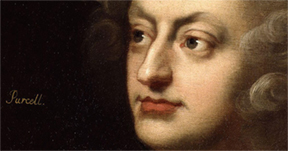
there are five reasons,
there are five reasons we should drink:
Good wine, a friend, or being dry,
Or lest we should be, by and by;
Or any other reason, or any other reason,
Or any other reason why, any reason why!
In stiller Nacht German folk song arranged by Johannes Brahms (1830-1896). From 33 Deutsche Volkslieder (No. 42).
Transcribed for men’s voices a cappella by Bruce Trinkley.
One of Brahms’ most beautiful and popular settings now in an edition for men’s voices.
View TTBB note, poem and score. Listen to SATB version sung by the Atlanta Master Chorale.
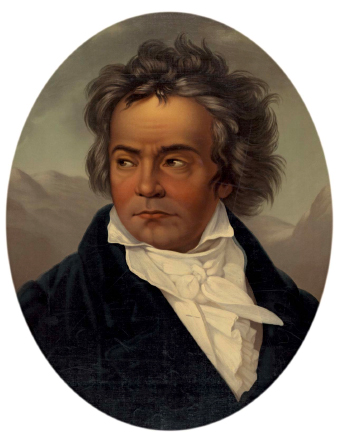
Ludwig's Männerchor Four Choruses by Ludwig van Beethoven (1770-1827) edited for TTBB and piano. This collection brings together in a performing edition shorter choral works edited and arranged for men’s voices. Although intended as a set, the pieces may be performed separately.
2. Parting Song (Abschiedgesang) WoO 102 Download the score. Beethoven wrote the elegant and moving Parting Song for the farewell party of Dr. Leopold Weiss, who was leaving Vienna. This drinking song in three parts salutes Ganymede, the wine pourer for the Greek gods.
3. Come Fill, Fill, My Good Fellow (Trinklied) From Twenty-five Scottish Songs Op.108, No. 13 Download score. Come Fill, Fill, My Good Fellow is a rollicking Scottish drinking song and one of the most tuneful of the many folk songs of the British Isles that Beethoven arranged for publication.
4. Song of Union (Bundeslied) Opus 122 (text by Goethe) Download score. Song of Union is one of the finest of Beethoven's shorter choral works, with a text by Goethe, translated into English.
The Merry Gregs The Gregorian Constitution Song by Henry Carey (1689-1743) Arranged for men's voices.
Henry Carey, English playwright, poet and occasional composer, wrote theatrical works and contributed songs to reviews. The Merry Gregs was written as a duet for a collection titled The Musical Century, published in 1740. Its text and music are in the style of the English glee of the 18th Century.“Gregorians” refers to a gentlemen's social club in London in the 1730's.
View score. Listen to midi.
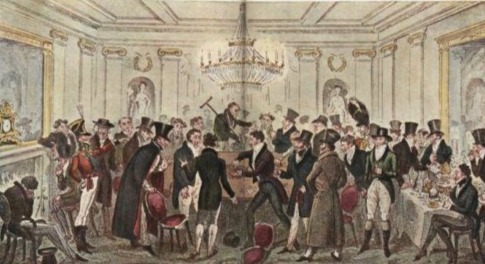
In long and lasting Lays.
While Hearts and Voices joyning in gladsome songs combining.
sing forth their deathless Praise
If innocent Variety, Content and sweet Society
Can make us Mortals blest;
In social love united, With harmony delighted,
We Emulate the best.
Our Friendship and Affinity Surpasses Consanguinity
As Gold surpasses Ore;
Success to every Brother, Let's stand by one another,
Till Time shall be no more.
Oh Home Beloved (Myfanwy) Music by Joseph Parry (1841-1903).
Lyrics by Evan Stephens (1854–1930).
For men’s voices and piano with optional string bass.
For a complete discussion of the history of the song visit the Wikipedia page.
Commission and Premiere:
Huntington Men’s Chorus.
A sabbatical research grant in 1993-1994 enabled me to travel to Wales and crisscross the country sitting in on rehearsals of the legendary Welsh male voice choirs. I encountered a lot of new repertory and folksongs. Years later, the Huntington Men’s Chorus asked me to arrange the Welsh national song Myfanwy for their repertory. I am pleased to share the concert arrangement - in English, alas - with you.
Download score. Listen to midi. Listen to the piece sung in Welsh by the Morriston Orpheus Choir.
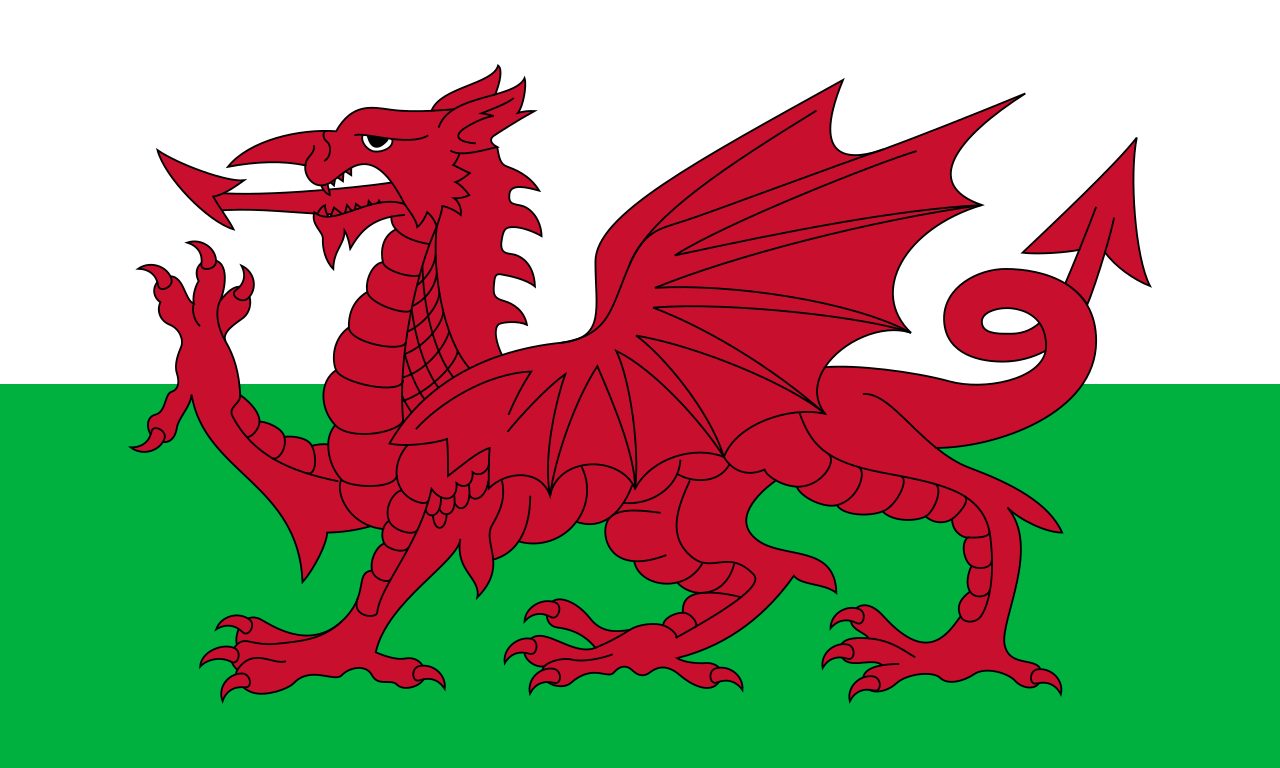
On foreign land or distant sea,
As time rolls by, my heart grows fonder
And yearns more lovingly for thee!
Tho fair be nature’s scenes around me,
And friends are ever kind and true,
Tho joyous mirth and song surround me,
My heart, my soul still yearns for you.
Three Glees Edited for TTB/TTBB. View notes.
1. Can You Tell Me What I Think Words and music by George Berg (c.1730 - c. 1760) Score. Midi.
2. Love Asleep Words and music by Samuel Long ( c.1725-1764) Score. Midi.
3. Discord Words and music by Samuel Webbe (1740-1816) Score. Midi.
Three Glees is drawn from A Collection of Catches, Canons and Glees, known as The Warren Collection, containing the best compositions sung by the London Catch Club from 1762 to 1793. Can You Tell Me What I Think is unique in its combination of the drinking song with the nonsense song. Love Asleep is a fine example of the multi-sectional glee. The first section is a soothing lullaby to Cupid, the god of love, followed by a hymn to peace, and concluding with a comic twist. Samuel Webbe, the best known of the London glee composers, and author of the ever-popular Glorious Apollo, produced nine collections of catches, canons and glees. Discord, a fine example of his multi-sectional pieces, opens with a dissonant evocation of Discord (the Roman goddess of conflict) and concludes with a lyrical evocation of peace. This is one of the great master's finest works, evidenced by its receiving a Prize Medal in 1772.
Wasserfahrt (Water Journey) by Felix Mendelssohn (1809-1847). From Sechs Lieder Opus 50, No. 4.
Lyrics by Heinrich Heine (1797-1856) from Buch der Lieder (1827).
Part song for TTBB Voices acappella. Edited by Bruce Trinkley.
Download score and translation. Listen to a German men’s choir.
And counted every wave.
Farewell, my lovely fatherland!
My ship speeds swiftly on!
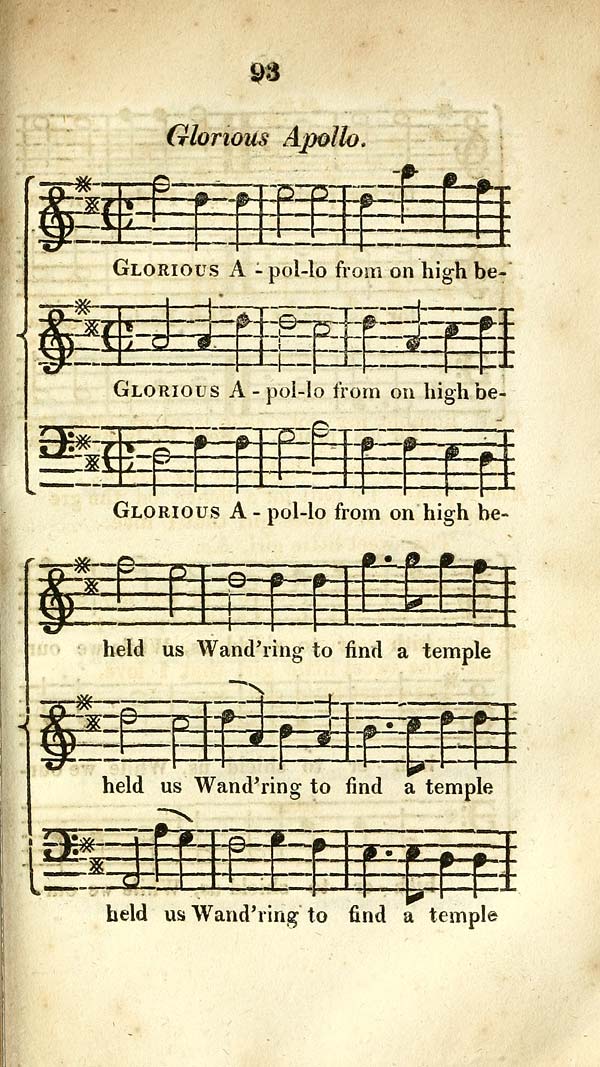
Webbe Pages from A Third Book of Catches Canons and Glees (c. 1775).
Music by Samuel Webbe (1740-1816).
Six Choruses for 3 and 4-part men's voices unaccompanied or with optional piano.
Editor’s note: As a conductor of men’s choruses, I had always appreciated and often programmed the classic glee Glorious Apollo by Webbe, and often wondered if there were other engaging unknown works by the composer. So for a sabbatical in 1993-94, I received grants to travel to London and research Webbe in the Warren Collection of Catches, Canons and Glees in the British Library. (With a further research trip to Wales to investigate the repertory of the Welsh male voice choirs.) I came home with photostats of works by Webbe, as well as his contemporaries, and proceeded to transcribe and edit the best of the lot into Webbe Pages and Three Glees for mixed voices. All the works are well-written for men’s voices, and although the texts may be a bit obscure, they are delightful to sing, by young voices or older. I invite you to explore the unknown Samuel Webbe.
View the notes and texts. Download the complete score.
2. Belinda's sparkling Wit Glee for Three Men's Voices. View score. Listen to midi.
3. To the festive Board Glee for Four Men's Voices. View score. Listen to midi.
4. My Fair is Beautiful Glee for Four Men's Voices. View score. Listen to midi.
5. The Spring Glee for Three Men's Voices. View score. Listen to midi.
6. Surly Giles' old Cat Catch for Three Voices. View score. Listen to midi.
American Folksongs
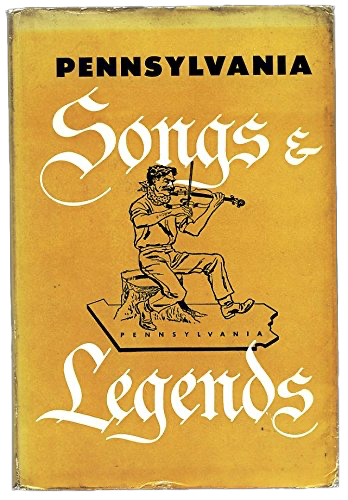
University of Pennsylvania Press 1949
Appalachian Mining Songs Five Pennsylvania folksongs arranged for TTBB, solo voices and piano.
Also available for SATB and piano. View Notes and Lyrics
A dramatic dialogue about a fight in the mines.
2. Down in a Coal Mine View score. Listen to midi.
The hearty young miner sings of life in the mines.
3. The Shoofly View score. Listen to Penn State Glee Club.
Life in the mining towns, before and after the coal is gone.
4. Union Man View score. Listen to Penn State Glee Club.
Humorous depiction of the ever-present tense relationships between the union and management.
5. Blue Monday View score. Listen to midi.
The miners got paid on Saturday night and spend all their money on Sunday making for a Blue Monday!
These songs were sung by 19th and early 20th century miners in the Appalachian Mountains of Pennsylvania, West Virginia, Ohio and Kentucky.
The songs originally appeared in Pennsylvania Songs and Legends edited by George Korson (1899-1967) and published by the University of Pennsylvania Press in 1949. Korson had collected the songs from the singers, miners and saloonkeepers who wrote and sang them.
The choral and vocal arrangements are dedicated to the memory of my father, William Trinkley (1890-1960), who began working in the coal mines of Pennsylvania when he was 9 years old.
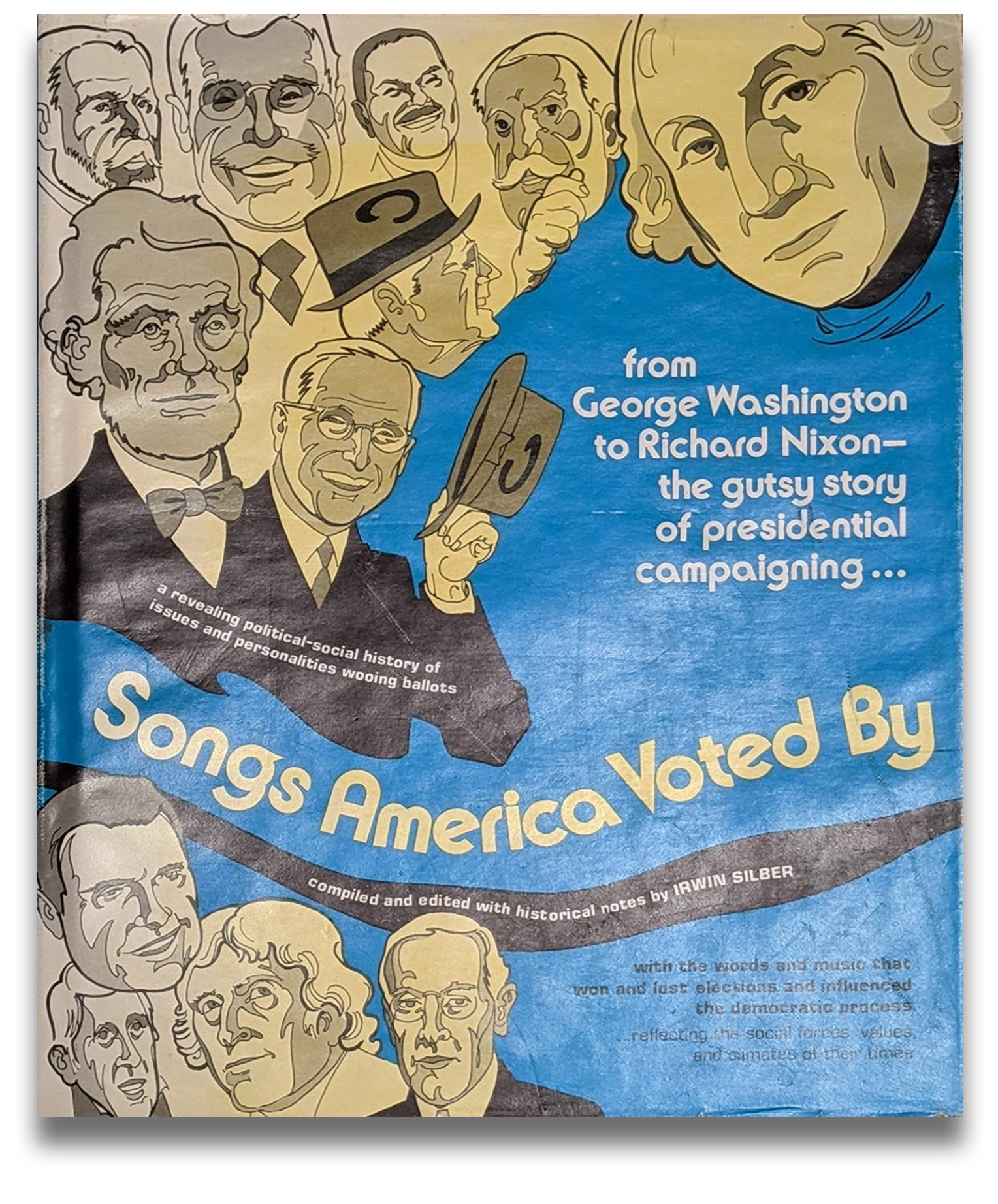
God Save Great Washington Presidential Campaign Songs from 1786 to 1972. 14 minutes.
15 songs for TTBB or SATB voices with solo voices and piano with optional string bass and percussion.
Commission and Premiere: The Penn State Glee Club performed the medley at every election year Homecoming Concert – with a straw vote taken with the audience! The songs still reflect the passions, vitriole and humor that partisan politics and the candidates inspired – from the earliest, God Save Great Washington for the campaign of George Washington in 1792, to Nixon Now in 1972. Most of the campaign songs in this collection are drawn from Songs America Voted By, compiled and edited by Irwin Silber.
Download TTBB score. Listen to Penn State Glee Club.
Ye tuneful powers combine, and each true Whig now join
Whose heart did ne'er resign the glorious cause. . . .
Reachin’ out to find the way to make tomorrow a brighter day.
Makin’ dreams reality, More than ever Nixon Now for you and me.
Hush, Little Baby American folksong arranged for TTBB unaccompanied.
This, my very first choral arrangement, was made for the then all male Notes and Keys of the Columbia University Glee Club. It was also my first publication. It takes a chromatic dramatic turn on the traditional lullaby with arrangement driven by the ballad elements of the folk text. Wikipedia: "Hush, Little Baby is a traditional lullaby, thought to have been written in the Southern United States. The lyrics promise various rewards to the child for remaining quiet. The simple structure allows more verses to be added ad lib”.
Hush, little baby, don’t say a word.
Papa’s gonna buy you a mocking bird.
If that mocking bird don’t sing,
Papa’s gonna buy you a diamond ring. . . . .
Download score.
Folksongs of the British Isles
All Through the Night Welsh folksong arranged for TTBB chorus unaccompanied.
Commission and Premiere: Penn State Glee Club. Performed on the 1990 Spring Tour at the Cathedral of St. John the Divine, New York City. The sustained pitches in this fresh harmonic setting replicate the lingering sonorities in a cathedral or very resonant space. Reminiscent of experimental choral writing of the 1970s.
View score. Listen to midi.
The Black Velvet Band Irish folksong arranged for TTBB or SATB chorus and piano.
A traditional folk song describing how a young man is tricked by the fair maiden and then sentenced to transportation to Australia, a common punishment in the British Empire during the 19th century.
View TTBB score. Listen to midi. Listen to The Dubliners (40th Reunion) or better yet, The Irish Rovers in Toronto!

Irish Ballads and Drinking Songs Six Irish Folksongs for TTBB voices, solo voices and piano.
Commission and Premiere: Penn State Glee Club’s 110th anniversary (1888-1998). October 1998.
Read the notes for a description of each of these brilliant Irish folk songs. The tunes are mostly familiar and are masterfully arranged for men’s voices to inspire and delight singers of any age. The set provides a tour through Ireland, its history and its very diverse musical heritage ranging from boisterous to lyrical.
View the notes. Download the full score.
2. It Chanced When I Was Walking View score. Listen to Penn State Glee Club, Homecoming 2004.
3. Come O’er the Sea View score. Listen to Penn State Glee Club.
4. The Black Horse View score. Listen to Penn State Glee Club.
5. Limerick Is Beautiful View score. Listen to Richard Kennedy, tenor and the Penn State Glee Club: The Green Album.
6. Garryowen View score. Listen to Penn State Glee Club, Homecoming 2004.
the River Shannon full of fish beside that city flows.
Tis not the river nor the fish that preys upon my mind
nor with the town of Limerick have I any fault to find.
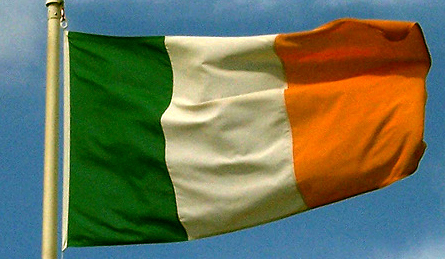
The Irish Minstrel For TTBB and TBB chorus, solo voices and piano (or unaccompanied).
This companion set to the Irish Ballads was written for the Hilos, the small ensemble of the Glee Club. They are all songs of wooing that The Minstrel Man might have sung about and directly to his beloved: some ardent, some humorous, but all with the wonderful Irish lyrics and tunes. The Hilos always had great fun singing of Peggy and her Low-Backed Car attracting all the boys on market day.
View the notes. Download the full score.
2. Nelly, My Love, and Me TTB and piano. View score. Listen to midi.
3. The Time I’ve Lost in Wooing TTBB unaccompanied. View score. Listen to The Hilos.
4. There’s a Colleen Fair as May TTBB and piano. View score. Listen to midi.
5. The Low-Backed Car Solo voice, TBB and piano. View score. Listen to The Hilos.
6. To Ladies’ Eyes 2 solo voices, TTB and piano. View score. Listen to The Hilos.

The scores of hearts she slaughters by far outnumbers these;
while she among her poultry sits, just like a turtledove,
well worth the cage, I do engage, of the blooming god of Love:
while she sits in her low-backed car, the lovers come near and far
come and envy the chicken that Peggy is picking
as she sits in The Low-Backed Car.
Three Irish Love Songs For TTBB voices, solo voices and piano.
More Irish love songs, these all very lovely but not so well-known except for Macushla. The name of the beloved is of Irish language origin meaning “pulse of the heart.”
View the notes and full score.
The Kerry Dance Music and Words by James Lyman Molloy (1837-1910). For TTBB Voices with piano and optional solos.
One of the first pieces of piano music I owned was a piano version of this grand tune, and I have always loved the melody and the various interludes. By the way, Molloy wrote nearly a hundred songs, of which two, The Kerry Dance and Love's Old Sweet Song (Just a Song at Twilight) have ensured him lasting fame.
View score. Listen to midi. Or better yet: Listen to the Irish tenor John McCormack (1936) with folk instruments.
Oh, the ring of the piper's tune!
Oh, for one of those hours of gladness,
gone, alas! like our youth, too soon!
When the boys began to gather in the glen of a summer night,
and the Kerry piper's tuning made us long with wild delight;
Oh, to think of it, oh, to dream of it, fills my heart with tears!
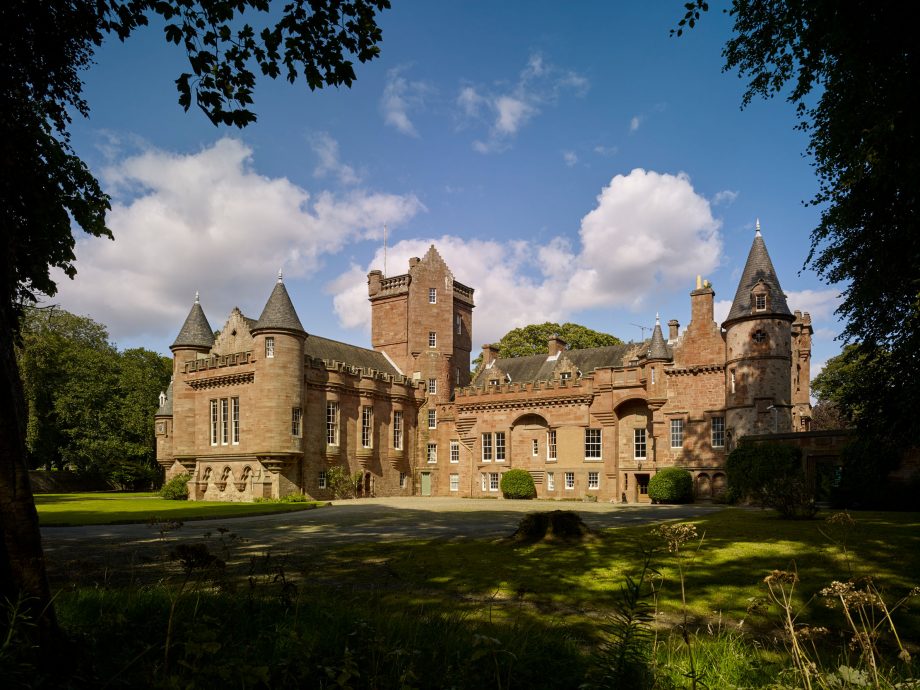
Scottish Ayres Three Scottish Folksongs for TTBB voices with soloists and piano.
The arrangements were written during a residency at the Patrick Allan-Fraser of Hospitalfield Trust in Arbroath, Scotland in October 2000. Dedicated to the Arbroath Male Voice Choir and their conductor, Helen Addison.The tune of The Road to Dundee is an Irish street ballad, and tells of a chance meeting with a bonnie young lassie. Lassie Lie Near Me is a Scottish folk ballad with lyrics by Robert Burns (1759-1796). Burns scholar Donny O’Rourke says: “A simple enough little lyric in folk song style, but with its heartfelt lover's plea and haunting melody, simply beautiful.” “Charlie” in the third song refers to “Bonnie Prince Charlie”, Charles Edward Stuart (1720-1788), also known as The Young Pretender since he was the oldest son of King James II. Charlie attempted to regain the throne of England and Scotland in the Jacobite uprising of 1745. He was warmly welcomed by the Scottish highland clansmen, but the Jacobites were defeated at the Battle of Culloden and Charlie fled to France. He is still fondly remembered by the Scottish today in this very political ballad.
View notes, texts and full score. The live renditions are by Scottish folk singers and the Glee Club.
2. Lassie Lie Near Me View. Listen to the Glee Club from The Green Album. Listen to Dick Gaughan.
3. Come O’er the Stream, Charlie View. Listen to midi. Listen to The Corries.
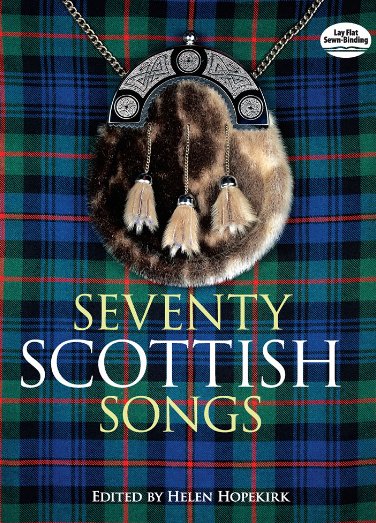
Three Scottish Highland Songs Arranged for TTBB, solo voices and piano. Hinshaw HMC1577
Accompaniments by Helen Hopekirk (1856-1945).
Hopekirk, a Scottish song composer, was also one of the foremost pianists of her time. She was born in Edinburgh, toured extensively as a concert pianist, and settled in Massachusetts. She had a deep love for Scotland - the people, the land and the music. Three Scottish Highland Songs is drawn from her only anthology, Seventy Scottish Songs. The first song shares sad memories of long lost love; the second implores black-haired Mary - Turn Ye to Me; while the third is another of the many spirited songs about Bonnie Prince Charlie, exhorting the Scots to support him in his quest to become king.
The vocal arrangements were written during a residency at the Hambidge Center in Rabun Gap, Georgia in June, 1996.
View notes and full score.
Latin American and Spanish Folksongs
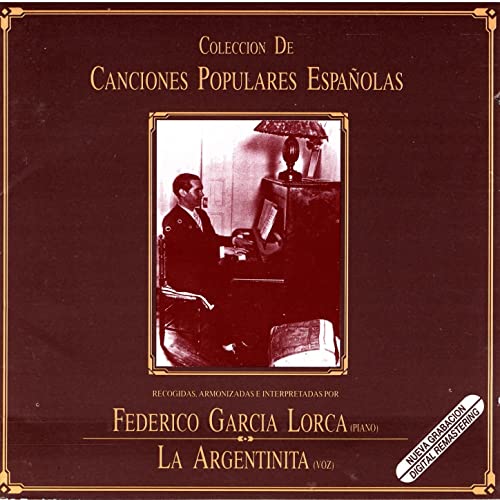
Cuatros Canciones Españolas Antiguas Four Spanish folksongs for TTBB chorus, 2 soloists and piano or guitar.
Also available for SATB. English texts by J. Jason Charnesky.
Download full score.
View score. Listen to midi. Listen to Patricia Caicedo, soprano, and Abel Roland, guitar.
2. Al pasar por Sevilla (Passing through Sevilla) View score. Listen to midi.
3. Zorongo (Andalucian dance) View score. Listen to midi. Listen to Garcia Lorca, piano, and La Argentinita sing in film from 1931. Listen to remastered recording of preceding.
4. Sevillanas del Siglo XVIII (Viva Sevilla) Collected and harmonized by Federico Garcia Lorca.
View score. Listen to midi. Listen to Spanish ensemble with dancer.
The two Spanish folksongs collected and harmonized by Lorca reflect his interest in cante jondo (Spanish deep song). They were published and recorded in Colección de Canciones Populares Españolas. In these arrangements, Garcia Lorca’s original accompaniments have been retained. The accompaniment may be performed either with piano or with two guitars.
The folksongs may be performed separately or as a concert suite.

Al pasar por Sevilla via una chiquilla y me enamoré.
La tomé de la mano y al campamento me la llevé.
As I strolled through the busy park, Waiting for my ship, soon to go,
There she stood with her lovely smile, And she set my heart all aglow.
Then I said, “Come with me, my dear, To my stately ship on the sea.
We will sail to the land of dreams. I will keep you there, safe with me.”
But she turned, with a look so sad, For it meant farewell, evermore;
And I knew I must sail away, I must leave her there on the shore.
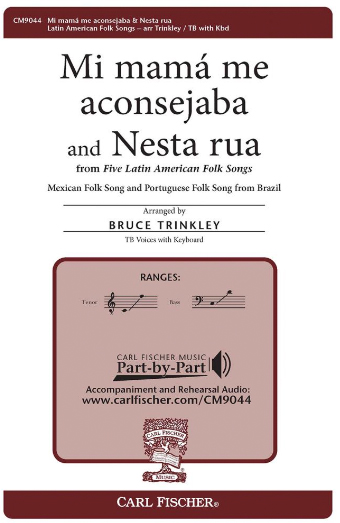
Five Latin American Folksongs Arranged for TB and piano. Recordings at Carl Fischer sites.
The first two of a set of five popular folk songs from Latin America, this choral includes a song from Mexico followed by a Portuguese folk song from Brazil. The music is expertly adapted for young male voices accompanied by a beautifully designed keyboard part. This is wonderful material for the young singers in the choir.
3. Una tarde fresquita de Mayo View score and listen.The third item in this set of Latin American gems is a more recent song, thought to have its origin near the end of the 19th century. This version is set for TBB ensemble, with a harmonically and rhythmically delightful keyboard part.
4. Alla en el rancho grande View score and listen.This Spanish language song is from the Southwestern United States and is one of the best- known cowboy songs. The Latin American flavor of the piece is greatly enhanced by the subtle harmony of the keyboard part.
5. Corrido de Macario Romero View score and listen. The final song in this set of Latin American folk songs for TB voices is a narrative ballad about the exploits and death of a soldier, Macario Romero. As is typical of the corrido (a narrative, ballad form), the song has many verses climaxing with the five shots that end Romero's life. This is a chillingly effective setting of a poignant tale.
Medleys of Theatre and Popular Songs

Abbey Road Medley from The Beatles 1969 ground-breaking album with piano and optional string bass. The high point of my career in high school and college summer breaks was ushering at the Hollywood Bowl on week-ends. The gig paid only five bucks on week-end nights, but you got free admission to the Tuesday and Thursday Hollywood Bowl Symphony concerts. And so I ushered for The Beatles first appearance at the Bowl in August 1964. I only saw The Beatles - never heard a note since the audience was primarily 13-14 year old female fans who proceeded to scream nonstop for the full two hours of the concert! But I can say I was there!
While not many of the Beatles songs lend themselves to choral versions, the lovely tunes in Abbey Road work well for men’s voices.
View score. Listen to the Penn State Glee Club, Blue and White Concert, April 26, 2003.
2. You Never Give Me Your Money
3. Golden Slumbers
4. Carry That Weight
5. The End
6. Her Majesty (Coda/Encore)
Big Ten Medley Various composers. For TTBB with piano and optional string bass.
Arranged for the Penn State Glee Club when Penn State joined the Big Ten Football Conference in 1990. I am proud of the musical “in-jokes”: all of the interludes between songs are motifs from the 4 major Penn State football songs. But only Penn State song aficionados will get it! Peter Eklund, Director of the University of Nebraska Varsity Men’s Chorus liked the arrangement so much that he commissioned a similar one for his Cornhusker singers. Same joke - different tunes! So listen and sing along to your favorite team’s football song.
View score. Listen to the Penn State Glee Club from The Blue and White Album.

2. Hail, Hail to Old Purdue
3. Illinois
4. Iowa
5. Minnesota
6. Go, U. Northwestern
7. Victory for MSU
8. Indiana
9. Nebraska
10. Maryland
11. Ohio
12. Rutgers
13. Hail to the Victors
14. Fight On, State
Harry Chapin Medley Songs by Harry Chapin (1942-1981) for TTBB voices and piano and optional string bass.
Commission and Premiere:
The Huntington Men’s Chorus, Huntington, Long Island. Harry Chapin was a Long Island native and the Huntington Chorus wanted to honor him and his musical legacy by commissioning a medley of his music. Harry was not only a songwriter-performer, he was also a noted philanthropist and food activist. So it was an honor for me to arrange his songs for the Chorus. Not many pop-rock songs lend themselves to successful choral arranging, but I think Harry’s lovely tunes are enhanced by choral performance. Harry was a great humanitarian, devoting the proceeds of his later concerts to feeding the poor. Many of his songs are autobiographical and tell The Story of a Life.
View score. Listen to midi.
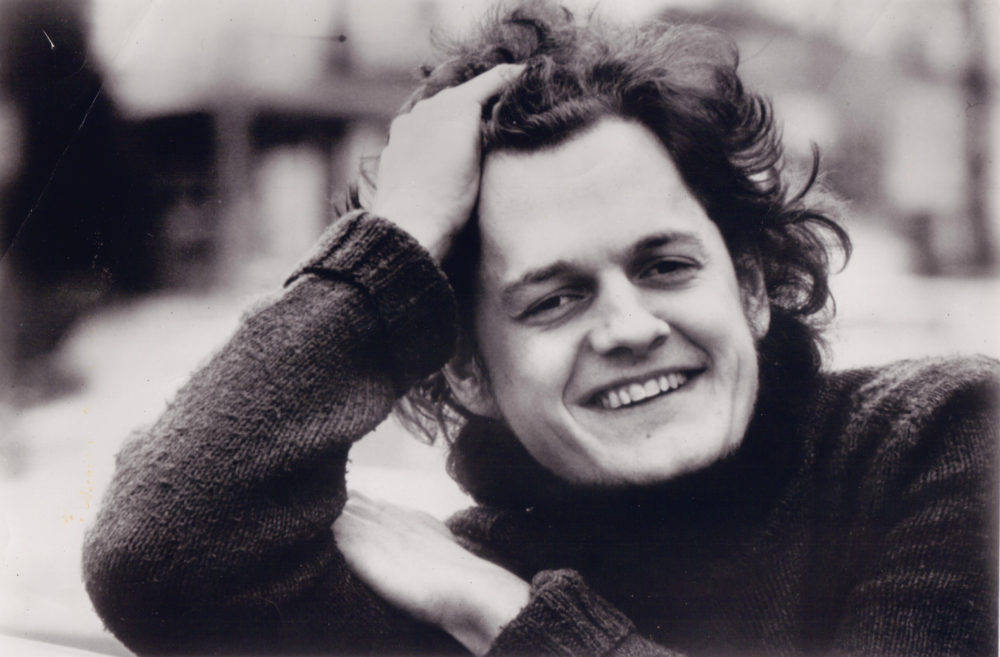
2. I Wanna Learn a Love Song
3. Dreams Go By
4. Story of a Life
5. She Sings Songs without Words
6. Remember When the Music
7. Cat’s in the Cradle
8. Circle
what one man’s life could be worth, I wonder what would happen to this earth.”
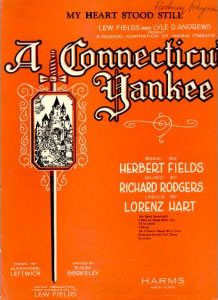
A Connecticut Yankee in King Arthur’s Court Music by Richard Rodgers (1902-1979).
Words by Lorenz Hart (1895-1943) from the 1935 musical based on the 1899 novel by Mark Twain.
For TTBB, solo voices (including mezzo or soprano) and piano.
I arranged these songs from this show because they were not as well-known as most of his other show tunes. They also show the variety of the theatre music that the team of Rodgers and Hart could produce.
2. Can't You Do a Friend a Favor? View score. Listen to midi.
3. To Keep My Love Alive TTBB and solo mezzo or soprano. View score. Listen to Mary Saunders, mezzo-soprano with the Penn State Glee Club.
4. Thou Swell View score. Listen to midi.
A Note about Richard Rodgers: I have always had a fondness for Richard Rodgers and his songs ever since the day in my college career when I had the gumption to call his office and asked to speak with him. I had written the score to the 1965 Varsity Show at Columbia and the producing organization, Columbia Players, had run out of money and was about to cancel the show. Since I knew Mr. Rodgers had written two Varsity Shows back in the 1920s (Rodgers provided the music for 1923's Half Moon Inn and collaborated with Hart on 1920's Fly With Me), I thought he might be willing to underwrite the new show. He indeed was willing - but the deans at Columbia called me on the carpet for having the audacity to speak to a very important alumnus on my own! The show did go on - but not until the following year, becoming the Varsity Show of 1966: The Bawd’s Opera with book and lyrics by Michael Feingold. But I knew Richard Rodgers was a good man, as well as America’s greatest Broadway composer and producer. Footnote: The Bawd’s Opera won the BMI Award for the best college musical in 1966.
Ellington Cantata Music and Lyrics by Duke Ellington (1899-1974) and others.
For TTBB voices, solo voices and piano with optional string bass and drums.
Originally arranged as jazz selections for the Hilos, the men’s specialty group from the Penn State Glee Club. Revised for full men’s chorus.
2. Five O'Clock Dream View score. Listen to midi.
3. Day Dream Lyrics by John Latouche (1914-1956) View score. Listen to midi.
4. It Don't Mean a Thing View score. Listen to midi.
View notes.

(1888-1959)
Huckleberry Finn Songs Music by Kurt Weill (1900-1950). Lyrics by
Maxwell Anderson (1888-1959) from an unfinished musical based on The Adventures of Huckleberry Finn, the 1884 novel by Mark Twain (1835-1910).
For TTBB voices, solo baritone and piano with optional harmonica.
View the lyrics.
A Noble Medley Words and Music by Ray Noble (1903-1978).
For TTBB voices, soloists and piano with optional string bass.
Arranged for and dedicated to the Gentlemen Songsters of the Huntington Men's Chorus. It is always a joy and a delight to arrange old standards for my friends out on Long Island. As the biography of English bandleader, composer and arranger Ray Noble states on his page on the Songwriters Hall of Fame: The songs of the late English bandleader and composer, Ray Noble, are very much of the type for which many take a historical look backwards in saying, “They don't write songs like that anymore.”

Will Rogers Follies Music by Cy Coleman (1929-2004) with lyrics by Betty Comden and Adolph Green from the 1991
Broadway musical about the life of American humorist and sage
Will Rogers (1879-1935).
For TTBB with solos and piano and optional string bass. Look Around also available for SAB and SATB.
My father was a fan of Will Rogers and often mentioned him with memories of the movies and the radio shows. So when the musical opened on Broadway, I was sure to see it, and was then inspired to arrange these songs, many sung by the star of the show Keith Carradine. I especially recommend Look Around, a song about ecology and the environment, a rare subject for a Broadway song in those days.
View notes.
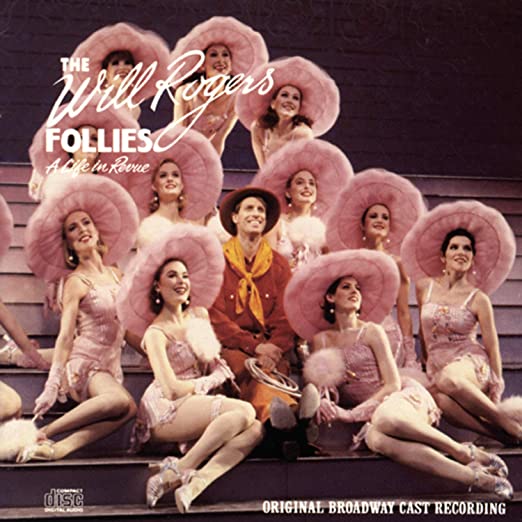
2. Look Around View score. Listen to midi.
3. Favorite Son View score. Listen to midi.
4. Never Met a Man I Didn't Like View score. Listen to midi.
Look around, the world's a lovely sight,
lovely sky and sea, well, it used to be.
Look around, the world is shining bright,
watch the green grass grow, well, that once was so.
Where's the spring that loved the rain?
Where's the grove down Lover's Lane?
Look around, they vanish overnight.
Where's the lovely world we used to see?
Who closed the open skies, the view clear to the horizon?
Look around, they disappear from sight,
and when I recall what used to be,
I'm weeping like a weeping willow tree,
just look around, you'll see a memory.
Arrangements of Theatre Songs
Anthem Music by Benny Andersson and Björn Ulvaeus of the pop group ABBA, lyrics by Ulvaeus and Tim Rice, and book by Rice from the musical Chess (1984).
TTBB with solo tenor, piano and optional string bass.
View score. Listen to midi. Listen to Josh Groban.
Blue Moon Music by Richard Rodgers (1902-1979). Words by Lorenz Hart (1895-1943).
For TTBB or SATB with piano.
View score. Listen to midi. Listen to the pop hit sung by The Marcels.
Brotherhood of Man Music and Lyrics by Frank Loesser (1910-1969) from How To Succeed in Business without Really Trying (1961).
For TTBB and solo tenor with piano.
View score. Listen to midi. Listen and watch Robert Morse and Matthew Broderick introduce the nominee for Best Revival of a Musical - "How to Succeed in Business Without Really Trying" - Starring Daniel Radcliffe.
Cry the Beloved Country Music by Kurt Weill (1900-1950). Lyrics by Maxwell Anderson (1888-1959) from Lost in the Stars (1949) musical based on the novel by Alan Paton (1903-1988).
For TTBB with baritone solo and piano and optional oboe.
View score. Listen to midi. Listen to original cast album recording.
If We Only Have Love Music and Lyrics by Jacques Brel (1929-1978) from Jacques Brel Is Alive and Well and Living in Paris (1968). English Lyrics by Mort Shuman and Erick Blau.
For TTBB chorus, piano and optional string bass. Arranged for the Penn State Glee Club, 2003-2004.
View score. Listen to midi. Listen to original cast.
Madeleine Music and Lyrics by Jacques Brel (1929-1978) from Jacques Brel Is Alive and Well and Living in Paris (1968). English Lyrics by Eric Blau.
For TTBB chorus, piano and optional string bass. Arranged for the Hilos.
View score. Listen to midi. Listen and watch Jacques Brel in this brilliant performance.
My House Music and Lyrics by Leonard Bernstein (1918-1990) from Peter Pan (1950).
For TTBB with solo tenor or baritone, piano and optional flute or chamber orchestra (string quintet oboe and 2 horns).
View score. Listen to midi.
My Romance Music by Richard Rodgers (1902-1979). Words by Lorenz Hart (1895-1943) from Jumbo (1935).
For TTBB or SATB with piano.
View score. Listen to midi.
The Rhythm of Life Music by Cy Coleman (1929-2004). Lyrics by Dorothy Fields (1905-1974) from Sweet Charity (1966).
For TTBB acappella. Arranged for the Hilos.
View score. Listen to midi. Listen and watch Sammy Davis, Jr.
Send in the Clowns Stephen Sondheim (1930-2021) from A Little Night Music (1973).
For TTBB or SATB with piano and optional flute, clarinet and string bass.
View score. Listen to midi. Listen to Glynis Johns.
September Song Music by Kurt Weill (1900-1950). Lyrics by
Maxwell Anderson (1888-1959) from Knickerbocker Holiday (1938)
For TTBB with solo baritone and piano. Dedicated to Robert and Maxine Trehy.
View score. Listen to midi. Listen to Walter Huston on an LP from the original Broadway production.
Somewhere Music by Leonard Bernstein (1918-1990). Lyrics by Stephen Sondheim (1930-2021) from West Side Story (1957) .
For solo quartet or TTBB chorus acappella. Also for SSAA.
View score. Listen to midi.
So Pretty Music by Leonard Bernstein (1918-1990). Words by Betty Comden and Adolph Green.
For TTBB voices and piano with optional flute and string bass. Also available for SAB and SSA.
Anti-war song written for and performed by Barbra Streisand for a Broadway for Peace fundraiser on January 21, 1968, at Lincoln Center’s Philharmonic Hall.
View score. Listen to Lara Downes sing solo song.
Unusual Way Words and Music by Maury Yeston from Nine (1982).
For TTBB with piano and optional string bass.
View score. Listen to midi. Listen to Laura Benanti from 2003 Broadway revival.
Waitin' for the Light to Shine Words and Music by Roger Miller (1936-1992) from Big River (1985) based on Mark Twain’s The Adventures of Huckleberry Finn.
For TTBB with baritone solo, piano and tambourines.
View score. Listen to midi. Listen to John Goodman from the original Broadway cast.
Arrangements of Popular Songs
An American Hymn Music by Lee Holdridge. Lyrics by Molly Ann Leikin.
For TTBB or SATB chorus and piano.
Inspiring text and tune used as the main theme for the 1981 television miniseries of John Steinbeck’s 1952 novel East of Eden.
View TTBB score. Listen to midi. Listen to Placido Domingo sing the Three Tenors version.
Count Your Blessings Music and Lyrics by Irving Berlin (1888-1989))
For TTBB with piano or chamber cnsemble. Transcription of arrangement by Anthony Walts.
View score. Listen to midi. Listen and watch Bing Crosby in White Christmas.
Easter Parade Music and Lyrics by Irving Berlin (1888-1989) For TTBB and piano.
View score. Listen to midi. Listen to Bing Crosby.
Glorious Beer Music by Will Godwin (1859-1913) Music hall song.
For TTBB acappella with solo voice.
View score. Listen to midi.
The Green Leaves of Summer from The Alamo Music by Dmitri Tiomkin (1894-1979). Lyrics by Paul Francis Webster (1907-1984).
For TTBB with solo tenor and piano or guitar. Arranged for the Hilos 1999-2000.
View score. Listen to midi. Listen to The Brothers Four sing it in 4/4, not 6/8 time.
Here's That Rainy Day Music by Jimmy Van Heusen (1913-1990). Lyrics by Johnny Burke (1908-1964).
For TTBB with soprano or tenor solo and piano.
View score. Listen to midi. Listen to Nat King Cole.
A Hundred Years Hence Music by John Hutchinson (1821-1908). Words by Frances Gage (1808-1884).
For TTBB with piano or acapella.
View score. Listen to midi. Listen to Chestnut Brass Company.
I Will Wait for You Music by Michel Legrand (1932-2019)) from The Umbrellas of Cherbourg (1964).
For TTBB with solo voice, piano and string bass.
View score. Listen to midi. Watch Catherine DeNeuve and Nino Castelnuovo in the film.
I Wish I Knew How It Would Feel To Be Free Music and Lyrics by Billy Taylor (1921-2010).
For TTBB with solo voice and piano.
Dedicated to the memory of Nina Simone, “The High Priestess of Soul” (1933-2003).
View score. Listen to midi. Listen to Nina Simone.
Island in the Sun Jamaican Song with Music and Lyrics by Harry Belafonte and Lord Burgess.
For TTBB with solo voice, piano and optional percussion.
Dedicated to Frank Worrell and The Penn State Glee Club.
View score. Listen to midi. Listen to the Master - Harry Belafonte.
Lili Marlene Music by Norbert Schultze (1911-2002). English lyrics by Mack David (1912-1993).
For TTBB with solo voice and piano.
To the memory of my parents, Verna Virginia Lansberry Trinkley (1901-1979) and William Thomas Trinkley (1890-1960).
Wikipedia: “Lili Marlene met the inner mood of millions of soldiers of all armies who were fighting on both sides of the fronts and was translated into about fifty languages to become one of the global cultural "index fossils" of the Second World War.”
View score. Listen to midi. Listen to Marlene Dietrich.
Little Liz Music Hall song arranged for TTBB acappella. Based on the rote rendition by Bailey “Oats” Harvey, Director of the Columbia Glee Club 1952-1967.
Little Liz has served as the rousing closer or encore for the Notes and Keys from the Columbia Glee Club and for the Hilos from the Penn State Glee Club, both directed by Bruce Trinkley.
View score. Listen to midi.
Maybe this Time Music by John Kander (b.1927) and Lyrics by Fred Ebb (1928-2004) from the film Cabaret (1972).
For TTBB with piano and optional bass and drums.
View score. Listen to midi. Listen and watch Liza Minelli.
Nobody Music by Bert A.Williams (1974-1922).
For TTBB chorus and piano (bass and drums with optional clarinet, trumpet and trombone).
Piano part adapted from Mel Marvin's arrangement in Tintypes (1980).
Bert Williams: “I have never been able to discover that there was anything disgraceful in being a colored man. But I have often found it inconvenient -- in America.” “A black face, run-down shoes and elbow-out make-up give me a place to hide. The real Bert Williams is crouched deep down inside the coon who sings the songs and tells the stories.”
View score. Listen to midi. Listen to Nina Simone.
Scarlet Ribbons Music by Evelyn Danzig (1902-1996) and Lyric by Jack Segal (1918-2005).
For TTBB with piano.
View score. Listen to midi. Listen to Harry Belafonte - the classic recording.
Sing a Song with Me Music and Lyrics by Wally Harper (c.1941-2004) and Paul Zakrzewski.
For TTBB with solo tenor, piano, bass and drums. Also for SSA/SATB
View score. Listen to midi. Listen to Jason Hetrick, tenor and The Penn State Glee Club, 20th Anniversary Blue and White Concert.
Listen to Wally Harper and Barbara Cook at Carnegie Hall.
Take Me out. . . Music by Albert Von Tilzer (1878-1956) Words by Jack Norworth (1879-1959).
Encore for barbershop quartet or TTBB chorus acappella.
This arrangement is dedicated to Patricia Pratt, my 12th grade choral director at Palos Verdes High School in California. Miss Pratt, who was a wonderful jazz pianist and performer, would sit at the piano and play and sing this song, but starting the tune with the second word of the lyrics. Her rendition inspired this arrangement. She was brilliant and hilarious.
View score. Listen to midi.
Turn the World Around Words and Music by Harry Belafonte and Robert Freedman (1934-2018). Adapted from the arrangement by Larry Farrow. For TTBB with piano and optional string bass.
Arranged for the Penn State Glee Club Spring Tour to Trinidad and Tobago in 2004.
View score. Listen to midi.
Listen to the Master - Harry Belafonte.